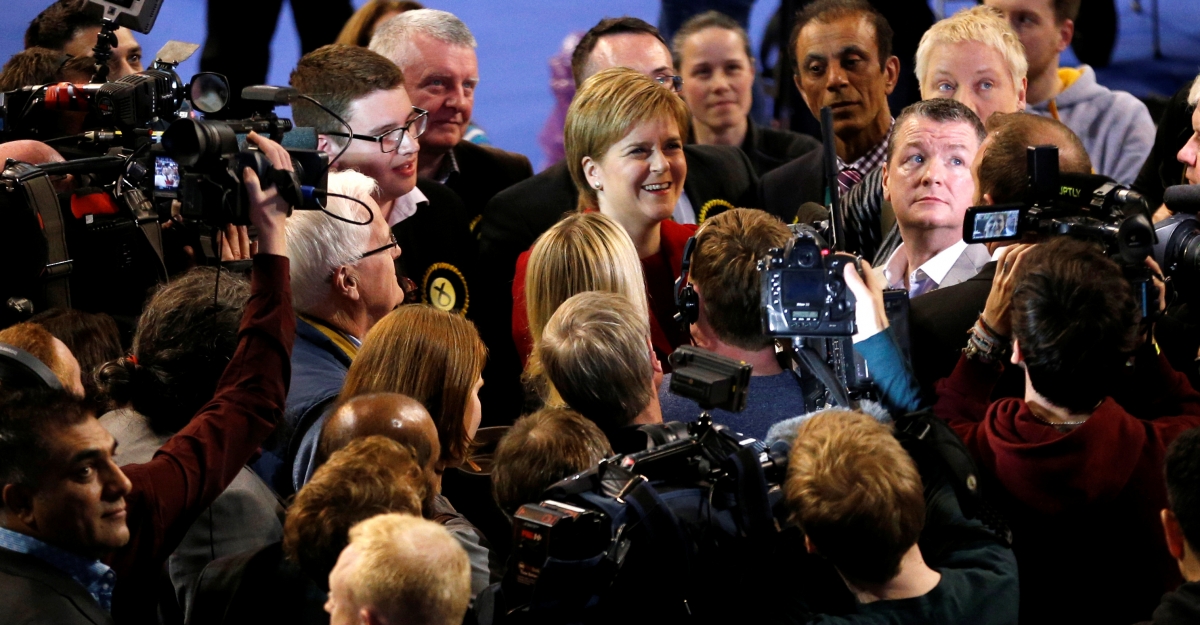Scottish leader: If Britain leaves the E.U., we’ll leave Britain

Then-Scottish First Minister Alex Salmond spoke during a news conference at the Edinburgh International Conference Center just days before voters went to the polls to decide whether Scotland should become an independent country and leave the United Kingdom. (Matt Cardy/Getty Images)
On May 25, 2016, Salmond spoke with Washington Post London Bureau Chief Griff Witte about next month’s referendum on British membership in the European Union, and its possible impact on the cause of Scottish independence. An edited transcript of their conversation follows:
Washington Post: If you look at opinion polls, there does seem to be a clear divide between attitudes in Scotland and attitudes in England. Can you tell me why you think that is?
Alex Salmond: You're quite right. The Scottish polls are running at 2-to-1 for “Remain” and the English polls are running neck-and-neck, at best a narrow majority for Remain. I think it reflects the two different outlooks for the country. The cause of Europe has become interlinked with the cause of independence, and many people vote for Europe because they support Scottish independence within the European context.
Scotland has always been a European-facing nation. Our greatest national hero was Sir William Wallace, memorably played by Mel Gibson in the movie "Braveheart." Well, one thing that Braveheart didn't show was a few days after the battle of Stirling Bridge, which was Wallace's great victory over the English forces of Edward I, his first act as guardian of Scotland was to write to the Hanseatic League, which was the medieval forerunner of the European Union, to say “There has been a change in Scotland. We are back in charge. We are open again for business.” That was in 1296. But it does provide an interesting illustration of how the cause for Scottish independence and its European approach has always been heavily interlinked.
WP: I noticed that in your explanation, you don't mention immigration, which is one that a lot of people cite. Obviously, immigration has been much heavier to certain parts of England than it has been to Scotland.
AS: That's correct in the sense that the predominant problem Scotland has faced, over the last two centuries has not been immigration but emigration.
Scotland is not full up. It means that on balance, we are much more concerned with growing the country, growing the population, growing the vibrancy of the economy and allowing people with commitment and skills to settle in our country.
We're much more like America of 100 years ago, than the England of today.
WP: You've been very critical of the way the Remain campaign has comported itself during this debate, saying it's been Project Fear all over again, the same as it was during the Independence debate. Do you think the Remain campaign is putting this contest in jeopardy?
AS: I do — and that's why I have been cautioning the prime minister not to proceed in this way. You can scare the bejesus out of people, no question about that, and they are doing their best to do that. And you can cow people into submission. But I’ve never known a fear campaign to lure people into the polling station. If you base your ideas on Project Fear then you are begging for a low turnout of your supporters. And the danger for the Remain campaign across the U.K. is a low turnout of Remain supporters and a high turnout of Brexit supporters, and Project Fear does nothing to encourage turnout.
WP: You and other SNP leaders have raised the prospect that if the U.K. should vote to leave, but Scotland votes to Remain, that it may be time for another independence referendum. You've also said, quite famously before the independence referendum, that it was "a once in a generation" choice. On what basis would you feel justified in going back on that vow?
AS: On the mandate of the general election last year, where the SNP won 56 out of 59 Scottish seats, and then the mandate of the Scottish elections, where this was explicitly in the manifesto, and the SNP scored another extraordinary victory.
My view has always been that constitutional referendums tend to be once in a generation, as I said often enough. But you can always get change of material circumstance. And pulling Scotland out of the European Union against our will would be a change of material circumstances. So the justification is amply there to say all bets are off if it's Brexit for the U.K. but a Remain vote for Scotland.
WP: All bets are off — does that mean in that scenario that another independence referendum is a certainty?
AS: That's my view if that transpires. I'm campaigning for a Remain vote. I'm campaigning in every country on these islands, I'm campaigning in England, Scotland and Ireland and Wales, over the next four weeks for a Remain vote. But, if the circumstance came about that Scotland voted heavily Remain, and England voted Out, and therefore because it's 10 times the population size it carried Scotland out, or attempted to, against our will, then my view is a referendum on Scottish independence within the next two years and this time the result will be “Yes.”
WP: You say you're campaigning across the UK. I was just up in Edinburgh, I had been there to cover the independence referendum, and during that campaign you had campaigners out on the streets all day long, all night, you had signs everywhere. That was a very enthusiastic, motivated campaign. There is not much evidence of a campaign underway now. Is the SNP really pulling out all the stops to make sure that Britain stays in the E.U.?
AS: The SNP activist base has been campaigning for the last three months to get the SNP government re-elected in the Scottish Parliament, and you cannot ask people who have campaigned for three months to say, “Right, back on the streets again guys.” You have to give a bit of time for people to catch their breath before you go into the final few weeks of the campaign.
WP: The prime minister, by calling both of these referendums — the Scottish referendum and the E.U. referendum — was trying to put these great existential questions to rest. Has that strategy backfired? Are these issues basically never going to be put to rest until Britain is out of the E.U. and Scotland is independent?
AS: I think independence is inevitable. We are just debating timescale now. The prime minister didn't call the Scottish referendum. The Scottish people called the referendum by electing a majority SNP government, on a manifesto to call a referendum. The prime minister had no choice in the matter, nor will any future prime minister.
If the Scottish Parliament votes for a referendum, then there shall be a referendum. Any U.K. prime minister will just have to concede. You can't put the genie back in the bottle.
Karla Adam contributed to this report from London




 A new poll by Lord Ashcroft has suggested that the Scottish Nationalist Party would become the third biggest party in England if they were to contest English constituencies.
A new poll by Lord Ashcroft has suggested that the Scottish Nationalist Party would become the third biggest party in England if they were to contest English constituencies.



